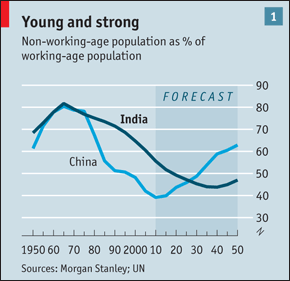 A compelling analysis from The Economist on how India's freer style of doing business, when combined with a huge and still unfolding demographic divided, could well trump China's current star turn in the global economy.
A compelling analysis from The Economist on how India's freer style of doing business, when combined with a huge and still unfolding demographic divided, could well trump China's current star turn in the global economy.
As I have noted for a while, China's demographic "golden hour" ends right now, as from here on out they add old people to their non-working-age population--despite the continued cut-off pressure applied through the single-child policy (Deng's gift to the world, for which we must be eternally grateful).
Point being: China's labor gets more expensive from here on out, but the good news should be, that means China's domestic consumption (higher wages) should become a huge driver in globalization. It's just that China will no longer have a no-brainer--pun intended--advantage. From here on out, the extensive growth must yield to intensive growth--as in, brain-fed. For somebody who believe his work has a lot to do with capacity-building (i.e., raising a generation of strategic thinkers), China looks like a huge market to me already: they're having outsized impact throughout the world but aren't assuming commensurate responsibility, which I believe the Chinese shudder from out of fear that it'll be draining (yes) and complex (yes) and demand all manner of innovative thought on their part (absolutely). But the Chinese have no choice; the world simply will demand it all from them. So developing China's human capacity is magnificently important for the future of the world--as in, we depend on it. So whenever I hear about China cranking all manner of this or that skill set, I say, bring it on, and--by doing so--elevate your game and ours. Our education is stuck in industrial era mode and must be radically reformed, but we won't do it without the push of serious competition.
Conversely, China's own internal reforms, I believe, will be increasingly driven by a sense of India coming up on its heels--all good stuff with all the same attendant dangers. The question always to be asked when great powers compete intensely on the economic landscape is, "What is the state of the military-to-military relationship?"
When I look at China-US, I spot a moribund relationship. When I spot India-US, it looks promising but still too embryonic. And when I spot India-China, I spot another extremely weak bond.
These are the three dominant economies that will have both the will and wallet, over the long haul, to shape the global security landscape. Europe is taking a pass, primarily for demographic reasons. Russia is similarly cursed. China has a solid window, with India's even bigger. America, a demographic freak of nature, retains it own.
So, from a security standpoint, the most important hearts-and-minds to win are all found within that trio of powers. Keep the relations open and cooperative, and the economic competition will never spill over into anything truly bad, but keep them weak, and all sorts of bad choices linger out there.
I stick with my tighter logic that says: go for China and you get India in the bargain, while going for India as a China hedge, if done too vigorously, gets you neither, for China will withdraw from the logic of security cooperation and India, as we all know, hates being played as pawn more than anything.
So the goal must be: do whatever it takes to work the security cooperation with China, encouraging India to join at every possible junction. The tiny bit of naval cooperation on Somali pirates is a start, but so much more can be done. In a world of frontier integration, America needs two friends with million-man armies (with Turkey the next logical spoke in that wheel). No one but America will retain the warfighting power-projection capacity, but it's clear there are strong limits to what we can do with that and that alone. My concept of the SysAdmin was always about reorienting our major alliance relationships, and demographics was always the underlying driver. Why? The rise of the middle class triggers the resource relationships, and those relationships must be protected. Same thing that happened with the US in the late 1800s; same thing happening with China, India, Turkey, Brazil, etc. now. We are in the midst of a huge swapping out of allies, from North/West to East/South, and America is the connection that binds the two eras, because America's system of states-uniting, economies-integrating, networks-expanding, collective security and so on is the underlying template of this era's hugely successful globalization.